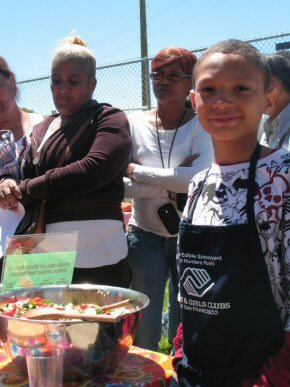
Nick offers the salad he prepared from the garden to his clubmates
Cross posted from the Let’s Move! Blog:
I recently visited the Willie Mays Boys and Girls Club to find out from the children what participating in USDA’s Summer Food Service Program means to them. Year-round, afternoons at the Club means the children get to cook a healthy bean and kale soup, with fresh ingredients they grow in the Club’s Edible Schoolyard. It also means that on a cool winter day a few blocks away from the San Francisco Bay, children brave the weather to water and tend to their garden knowing the strawberries will soon be ready to eat. For Rena, the first strawberry that she ever ate came from the Edible Schoolyard, where she planted it. Now, of course, strawberries are her favorite food. Read more »
Read more »
In today’s market, consumers have high expectations for the products they purchase. Beyond performance and pricing, consumers like the opportunity to make educated purchasing decisions for their families, and increasingly, decisions that that have an impact. USDA’s new biobased product label will enable consumers to do just that.
Initially, USDA’s Biopreferred program was created by the 2002 Farm Bill and was intended to help increase the purchase and use of biobased products within the Federal government and the commercial market. In 2008, Congress voted to reauthorize the program in an attempt to expand the reach of this successful program and to further promote the sale of biobased products. Read more »

Dairy goats browsing in Vermont pasture.
USDA’s Natural Resources Conservation Service (NRCS) awarded the University of Vermont (UVM) a Conservation Innovation Grant (CIG) in late 2010 that will help producers improve and reclaim marginal pasture and increase profits.
For many of Vermont’s beginning and experienced livestock farmers, having access to established pastures for grazing is one of the greatest limitations for production. Often land is infested with weeds, without enough forage to support a successful livestock operation. Producers most commonly control weeds with intensive grazing, mowing, or costly herbicides. Read more »
USDA’s Animal and Plant Health Inspection Service employees recently brought some holiday cheer to an unlikely group—basket weavers from the Rwanda Basket Company.
The Rwanda Basket Company provides training and tools to basket weavers in Rwanda. The Company helps to open overseas markets for the baskets and ensures a better profit for 400 weavers and their 3,000 dependents. The money provides education and improves conditions for those living in one of Africa’s poorest countries. Read more »

 Read more »
Read more »
